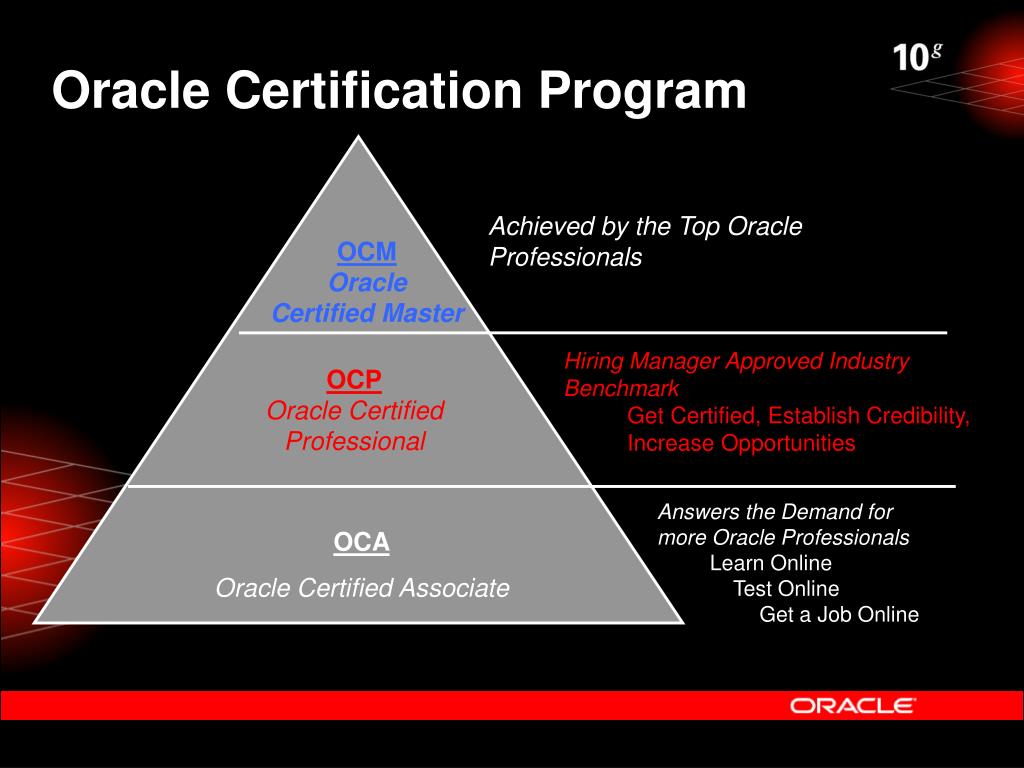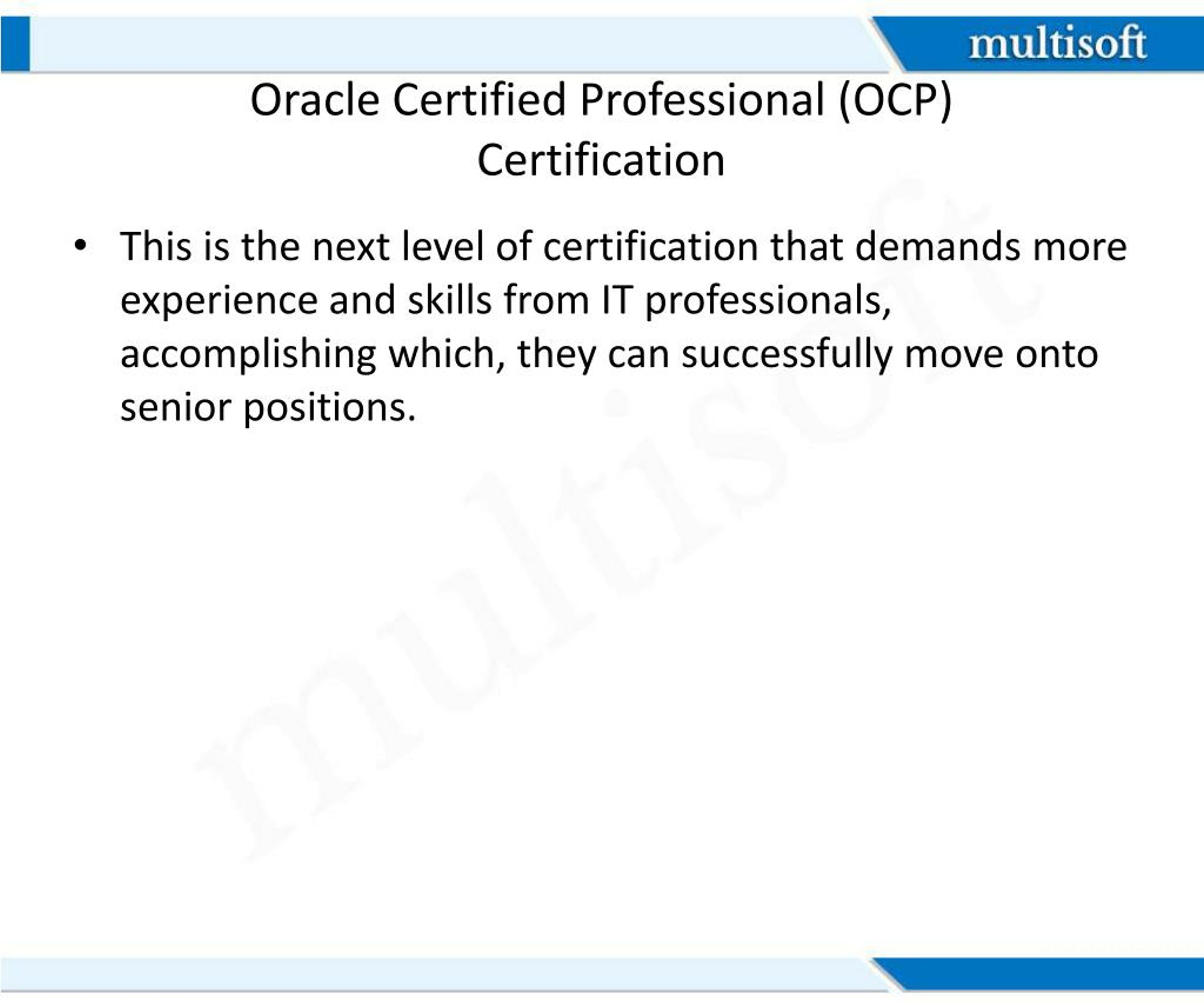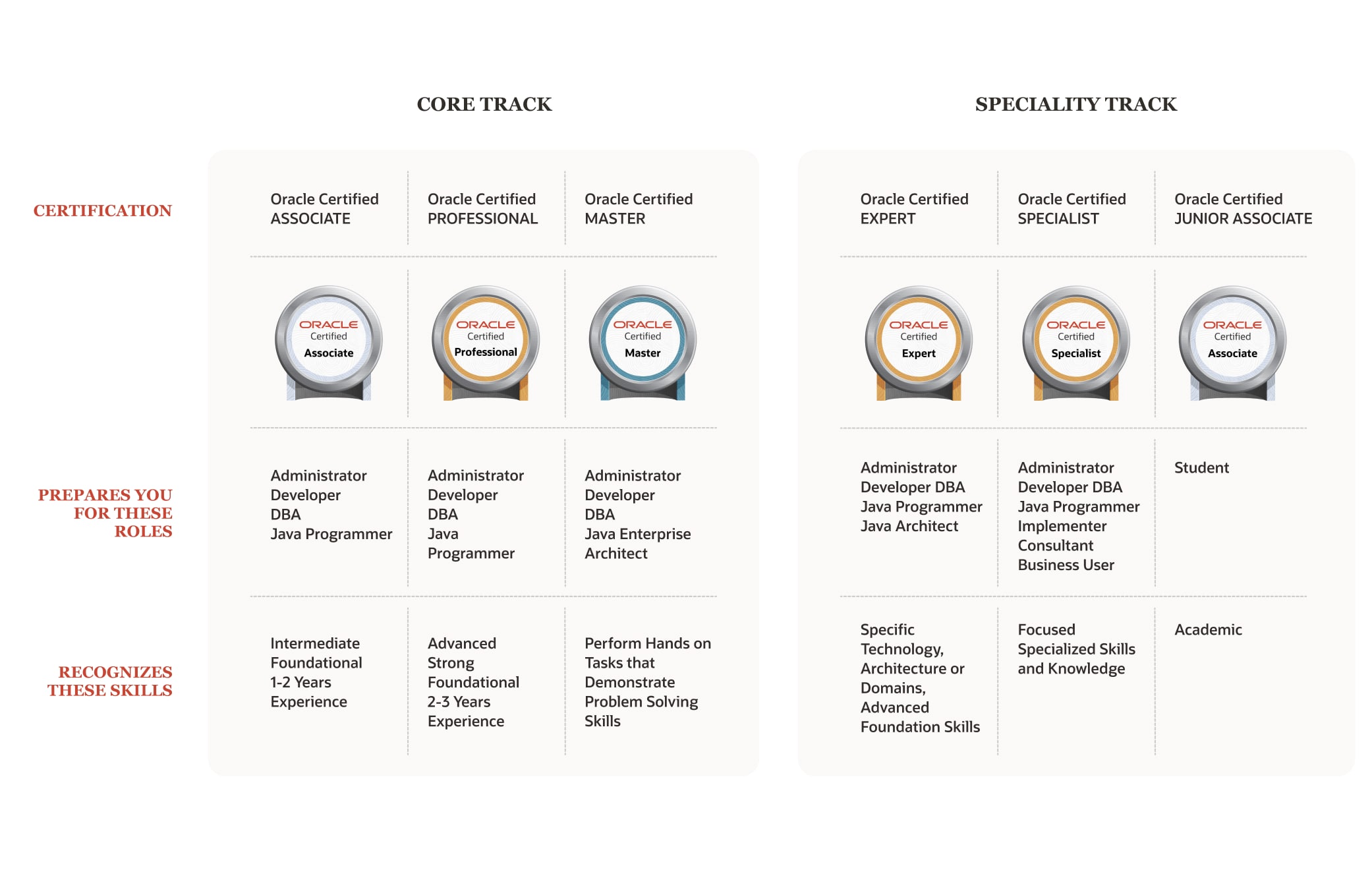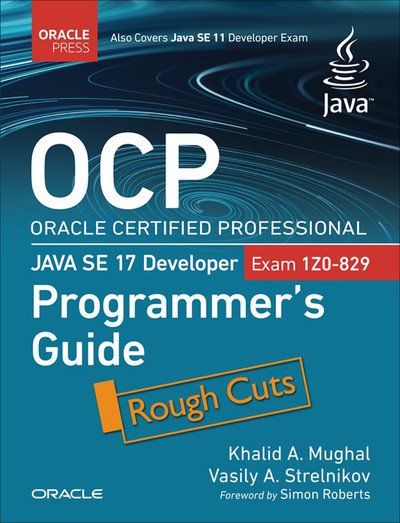What is the Oracle Certification Program (OCP)?
The Oracle Certification Program (OCP) is a globally recognized and respected credentialing system for IT professionals working with Oracle technologies. Established in 1995, OCP offers a wide range of certification tracks designed to validate the skills and expertise of individuals in various domains, including database administration, development, and cloud infrastructure. OCP certifications are highly valued in the IT industry, as they demonstrate a candidate’s proficiency in using Oracle products and solutions effectively. Earning an OCP certification can lead to career advancement, increased earning potential, and improved job prospects.
Why Pursue an Oracle Certification?
Obtaining an Oracle Certification Program (OCP) certification offers numerous benefits for IT professionals. These advantages include:
- Career Advancement: OCP certifications validate your skills and expertise, making you a more attractive candidate for promotions and higher-paying positions.
- Skill Enhancement: The process of preparing for OCP certification exams helps you develop a deeper understanding of Oracle technologies, ensuring you stay up-to-date with the latest industry trends and best practices.
- Higher Earning Potential: Oracle-certified professionals often receive higher salaries than their non-certified counterparts, reflecting their increased expertise and value to employers.
- Recognition by Industry Leaders: Many prominent companies, such as Oracle Corporation, Microsoft, and Amazon Web Services, recognize and prefer OCP-certified professionals for their Oracle technology projects and initiatives.
In addition to these benefits, OCP certifications can also help you build credibility and confidence in your abilities, making you a more valuable asset to your employer and opening up new opportunities for career growth and development.
How to Choose the Right OCP Certification Track
Selecting the appropriate Oracle Certification Program (OCP) certification track is crucial for maximizing the benefits of your certification journey. To choose the right track, consider the following factors:
- Job Role: Ensure the certification track aligns with your current job role or the position you aspire to hold. For instance, if you are a database administrator, consider pursuing an Oracle Database Administrator certification.
- Area of Expertise: Focus on certification tracks that match your skills and interests. For example, if you excel in programming, consider Java certification tracks.
- Personal Career Goals: Determine your short-term and long-term career objectives and choose a certification track that supports your professional growth and development.
Popular OCP tracks include:
- Oracle Database: This track offers certifications for administrators, developers, and SQL developers, catering to various roles within the database ecosystem.
- Java: The Java track includes certifications for associates and professionals, providing opportunities for developers to enhance their programming skills.
- Cloud Infrastructure: This track focuses on cloud-based technologies, offering certifications for foundations, administrators, and architects. Cloud Infrastructure certifications are increasingly valuable as businesses continue to migrate to cloud-based solutions.
Exploring the Oracle Certification Program (OCP) Tracks
Oracle Database Certification Paths
Oracle Database certifications are designed for professionals working with Oracle’s database management systems. These certifications validate your skills in designing, implementing, and managing Oracle databases. The three primary Oracle Database certification tracks are:
- Oracle Database Administrator: This track focuses on database administration, including installation, configuration, performance tuning, and backup and recovery. Oracle Database Administrator certification is suitable for database administrators, system analysts, and IT managers.
- Oracle Database Developer: This track targets developers who create and maintain applications that use Oracle databases. Topics covered include SQL, PL/SQL, data modeling, and application development. Oracle Database Developer certification is ideal for application developers, database designers, and data analysts.
- Oracle Database SQL Developer: This track is for professionals who specialize in using SQL to manage and manipulate data in Oracle databases. It covers SQL fundamentals, data manipulation, data querying, and database design. Oracle Database SQL Developer certification is recommended for database analysts, report developers, and data analysts.
To earn an Oracle Database certification, you must pass one or more exams, depending on the track. Prerequisites vary by certification level and track, so it’s essential to review Oracle’s exam requirements before enrolling. Job prospects for Oracle Database certified professionals are promising, with opportunities available in various industries, such as finance, healthcare, and technology.
Exploring the Oracle Certification Program (OCP) Tracks
Java Certification Paths
Oracle’s Java certification tracks validate your skills in developing, deploying, and managing applications using Java technologies. These certifications are ideal for software engineers, developers, and architects. The two primary Java certification tracks are:
- Oracle Certified Associate, Java SE 8 Programmer: This entry-level certification is for professionals with a basic understanding of Java programming concepts. It covers Java syntax, exception handling, and object-oriented programming. Earning this certification can lead to roles such as Java developer, software engineer, or application developer.
- Oracle Certified Professional, Java SE 8 Programmer: This certification is for experienced Java developers who want to demonstrate their proficiency in advanced Java concepts. It includes topics such as generics, collections, concurrency, and Java I/O. Obtaining this certification can result in career opportunities like senior Java developer, technical lead, or software architect.
To earn a Java certification, you must pass one or more exams, depending on the track. Prerequisites vary by certification level, so review Oracle’s exam requirements before enrolling. Java certified professionals are in high demand, with opportunities available in various industries, such as software development, finance, and healthcare.
Exploring the Oracle Certification Program (OCP) Tracks
Cloud Infrastructure Certification Paths
Oracle Cloud Infrastructure (OCI) certifications validate your skills in designing, deploying, and managing cloud-based solutions using Oracle’s cloud platform. These certifications are ideal for cloud engineers, architects, and administrators. The three primary OCI certification tracks are:
- Oracle Cloud Infrastructure Foundations: This entry-level certification is for professionals new to Oracle Cloud Infrastructure. It covers cloud concepts, OCI services, and security best practices. Earning this certification can lead to roles such as cloud engineer, cloud administrator, or cloud consultant.
- Oracle Cloud Infrastructure Administrator: This certification is for professionals with experience in managing and maintaining Oracle Cloud Infrastructure environments. It includes topics such as compute instances, network services, and storage management. Obtaining this certification can result in career opportunities like senior cloud administrator, cloud operations manager, or cloud infrastructure specialist.
- Oracle Cloud Infrastructure Architect: This certification is for experienced cloud professionals who want to demonstrate their expertise in designing and implementing Oracle Cloud Infrastructure solutions. It covers topics such as architecture design, migration strategies, and cost optimization. Achieving this certification can lead to roles like cloud solutions architect, cloud consultant, or cloud technical manager.
To earn an OCI certification, you must pass one or more exams, depending on the track. Prerequisites vary by certification level, so review Oracle’s exam requirements before enrolling. Oracle Cloud Infrastructure certified professionals are in high demand, with opportunities available in various industries, such as cloud services, IT consulting, and technology.
Preparing for Oracle Certification Exams
Study Materials and Resources
Preparing for Oracle Certification Program (OCP) exams requires a strategic approach, combining formal training, self-study, and hands-on experience. Here are some recommended resources and materials to help you succeed:
- Official Oracle Training Courses: Oracle provides a variety of instructor-led training courses and self-study e-learning courses designed to prepare you for OCP certification exams. These courses cover the latest Oracle technologies and best practices, ensuring you have the most up-to-date knowledge.
- Practice Exams: Practice exams are an excellent way to gauge your readiness for the actual certification exam. They help you identify areas where you may need additional study and provide insights into the types of questions you can expect on the exam.
- Study Guides: Study guides offer comprehensive overviews of the exam topics and often include practice questions, hands-on exercises, and key concepts. Look for study guides authored by Oracle experts or published by reputable technology training companies.
- Hands-on Experience and Real-World Projects: Nothing beats hands-on experience when it comes to mastering Oracle technologies. Seek opportunities to work on real-world projects, either in your current job or through volunteer work or internships. This hands-on experience will not only deepen your understanding of Oracle technologies but also help you apply your knowledge in practical situations.
By incorporating these study materials and resources into your preparation plan, you can increase your chances of success in OCP certification exams and enhance your value as an IT professional.
Preparing for Oracle Certification Exams
Exam Formats and Best Practices
Oracle Certification Program (OCP) exams assess your knowledge and skills in various Oracle technologies. Understanding the exam formats and following best practices can help you succeed. Here’s what you need to know:
- Multiple-Choice Questions: These questions test your knowledge of concepts and require you to select the correct answer from a list of options. To prepare, study key concepts, review official training materials, and practice with sample questions.
- Performance-Based Tasks: These tasks require you to perform specific actions in a simulated environment. They test your ability to apply your knowledge in real-world scenarios. To prepare, practice using Oracle technologies in a lab environment, and familiarize yourself with the exam interface.
- Case Studies: These scenarios present a problem and require you to apply your knowledge to find a solution. They test your critical thinking and problem-solving skills. To prepare, study real-world examples and practice analyzing and solving problems using Oracle technologies.
When preparing for OCP certification exams, follow these best practices:
- Create a study plan that includes a realistic timeline and milestones.
- Review official Oracle training materials, such as instructor-led training courses and self-study e-learning courses.
- Take practice exams to gauge your readiness and identify areas for improvement.
- Participate in hands-on labs and real-world projects to gain practical experience.
- Join study groups or forums to connect with other professionals preparing for OCP certification exams.
- Review key concepts regularly to reinforce your learning and prevent knowledge gaps.
- Develop a test-taking strategy that includes time management, understanding the exam structure, and reviewing key concepts before submitting your answers.
By following these best practices and understanding the exam formats, you can increase your chances of success in OCP certification exams and enhance your value as an IT professional.







